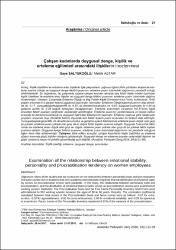Çalışan Kadınlarda Duygusal Denge, Kişilik ve Erteleme Eğilimleri Arasındaki İlişkilerin İncelenmesi
Künye
SALTUKOĞLU, Gaye & Melek ASTAR. "Çalışan Kadınlarda Duygusal Denge, Kişilik ve Erteleme Eğilimleri Arasındaki İlişkilerin İncelenmesi". Anadolu Psikiyatri Dergisi, 19.1 (2018): 21-28.Özet
Amaç: Kişilik özellikleri ve erteleme arası ilişkilerle ilgili çalışmaların çoğunun öğrencilerle yürütülen akademik erte-leme üzerine olduğu ve duygusal denge faktörü puanının, erteleme puanı üzerindeki dağılımının parabolik olduğu bildirilmektedir. Bu doğrultuda, bu çalışmada sadece çalışan kadınlar alınarak beş faktör kişilik modeli üzerinden kişilik özellikleri ile erteleme arası ilişkiler ve duygusal denge faktörü puanının, erteleme puanı üzerindeki dağılımı incelenmiştir. Yöntem: Çalışmada Erteleme Ölçeği ve Beş Faktör Kişilik Envanteri-Kısa Formu kullanılarak 18-60 yaşları arasında 512 çalışan kadına uygulama yapılmıştır. Sonuçlar: Erteleme Ölçeği toplam puanının dışa dönük-lük ile -0.17, yumuşakbaşlılık/geçimlilik ile -0.37, öz-denetim/sorumluluk ile -0.61, duygusal tutarsızlık ile 0.50 ve gelişime açıklık ile -0.28 bağıntı katsayıları hesaplanmıştır. Erteleme puanındaki varyansın %0.57'sinin kişilik envanteri faktör puanları tarafından açıklandığı görülmüştür. Erteleme puanının yordanmasına en büyük katkıyı sırasıyla öz-denetim/sorumluluk ve duygusal tutarsızlık faktörlerinin yapmıştır. Erteleme puanına göre oluşturulan grupların arasında Dışa dönüklük faktörü dışındaki dört faktör toplam puanı açısından da farklılık elde edilmiştir. Yumuşakbaşlılık/geçimlilik, öz-denetim/sorumluluk ve gelişime açıklık faktörlerinde erteleme puanı düşük olan grup en yüksek, erteleme puanı yüksek olan grup da en düşük faktör toplam puanına sahiptir. Duygusal Tutarsızlık faktö-ründe ise erteleme puanı düşük olan grup en düşük, erteleme puanı yüksek olan grup da en yüksek faktör toplam puanına sahiptir. Duygusal denge faktörü puanının, erteleme puanı üzerindeki dağılımının ise parabolik olduğuna ilişkin kanıt elde edilememiştir. Tartışma: Elde edilen sonuçlar, çalışan kadınlarda kişilik özellikleri ve erteleme düzeyi arasında güçlü ilişkiler olduğunu göstermiştir. Duygusal denge ve erteleme puanları arasındaki ilişkinin ise güçlü olmasına karşın ne şekilde gerçekleştiği açık değildir. Objective: Many of the studies that are conducted on the relationship between personality traits and procrastination that were carried out on students and their academic procrastination reported that the distribution of emotional stabi-lity scores on procrastination scores were parabolic. In this study, the relationship between personality traits and procrastination, and the distribution of emotional stability factor scores on procrastination scores were examined on working women. Methods: The Procrastination Scale and the Five Factor Personality Inventory Short Form were administered to 512 working women between the ages of 18 to 60 years. Results: The correlation coefficients calculated between total scores of the Procrastination Scale and factor scores were as follows: -0.17 for extra-version, -0.37 for agreeableness, -0.61 for conscientiousness, 0.50 for emotional instability, and -0.28 for openness to experience. Factor scores of the Personality Inventory explained 0.57% of the variance of the procrastination scores. The factors of conscientiousness and emotional instability made the largest contribution in predicting pro-crastination scores. Except for the extraversion factor scores there were differences in the remaining four groups’ factor scores when the procrastination scores were considered. Those receiving low procrastination score received the highest score on agreeableness, conscientiousness and openness to experience factors. Those receiving high procrastination score received the lowest total factor scores. For the emotional instability factor, the group scoring low on procrastination received the lowest; the group scoring high on procrastination received the highest factor score. No evidence was obtained about the parabolic distribution of emotional stability factor on the procrastination score. Discussion: Results showed that there was a strong relationship between personality traits and procrastina-tion level in working women. Although there is a strong relationship between emotional stability and procrastination, it is not clear how it occurs.



















